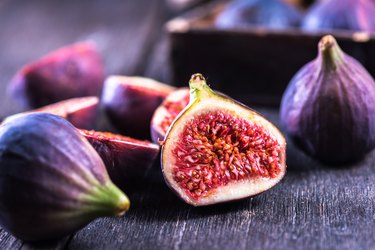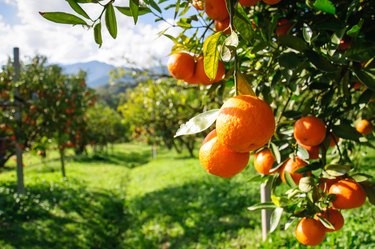
Rutin is one of the many nutrients we get from fruits and veggies. More specifically, it's a phytonutrient, and this group of compounds has been linked to a host of health benefits.
Most people get enough rutin from their regular diet (as long as they eat a lot of colorful fruits and vegetables), but there are also dietary supplements widely available at retail stores and online. Are these supplements worth the money?
Video of the Day
Video of the Day
Learn what rutin is good for and whether you need to supplement your diet.
What Is Rutin, Exactly?
Like other phytonutrients, rutin is also an antioxidant, which means it helps protect your cells from being damaged by toxic substances in your environment (think: pollution, cigarette smoke). Antioxidants also help our bodies balance harmful inflammation, says Robin Foroutan, RDN, an integrative medicine dietitian and spokesperson for the Academy of Nutrition and Dietetics.
Rutin's particular role relates to blood flow. "It improves circulation by strengthening the integrity of the blood vessels and improving blood vessel function," Foroutan says.
Potential Benefits of Rutin Supplements
Although research has explored the benefits of rutin supplements for heart health, cancer, infections (including COVID-19), diabetes, pain, Alzheimer's, skin health, eye health and more, the evidence in favor, so far, is slim.
"We don't have a whole lot of studies on it," says Amanda Beaver, RDN, LD, a wellness dietitian with Houston Methodist Wellness Services.
The studies we do have rely on cell culture lines or animals, not humans, so they can't really tell us how rutin supplements would behave in people, Beaver says. What's more: Many of the studies are more than a decade old.
Here's what the research tells us so far:
- Heart health: Studies have looked at whether rutin can prevent or treat varicose veins and blood clots. Some results were vaguely promising, but the studies were either poor quality or only looked at animals.
- Lymphedema: This is a side effect sometimes seen when lymph nodes are removed as part of cancer treatment. One small 2019 study in Lymphology found that people with lymphedema who took a combination supplement including rutin saw their swelling decrease. But more research needs to be done to verify these results.
- Pain and arthritis: The scientific evidence to support rutin for osteoarthritis is not strong, although there are anecdotal reports of this benefit, says Richard Sachleben, PhD, a chemist who has worked in the pharmaceutical sector and for a government research lab. Meanwhile, at least one human study, published in 2017 in The Journal of Nutrition, Health and Aging, suggests that eating more vegetables and fruit might decrease knee pain from osteoarthritis.
- Diabetes: Research is ongoing into whether rutin can lower blood sugar, but there's currently not enough data to draw any conclusions.
- Neurological conditions: Several animal studies have suggested rutin may help some of the harmful processes underlying Alzheimer's, Parkinson's and other degenerative diseases but, again, we can't draw any firm conclusions just yet.
- Eye health: There's not enough evidence to know if rutin supplements are good for the eyes.
- Kidney function: Rutin may have diuretic properties, but the evidence so far is preliminary.
- Cancer: Early studies suggest rutin may interfere with processes driving cancer, but mostly in animals and cell lines.
- Infections: Rutin may have an antibacterial and antiviral effect, according to early studies. Some traditional antiviral drugs given to people with COVID-19 in China contain rutin. Still, there's not enough evidence to know for sure.
- Skin health: There's limited evidence (in rodents) to suggest rutin may mitigate damage from UVB rays and reduce symptoms of dermatitis. We would need human studies to confirm this effect in people, though.
Is Rutin Good for Weight Loss?
There's no evidence to support using rutin supplements to help you lose weight, but loading your diet with natural sources of rutin — low-calorie, nutrient-dense fruits and vegetables — may help you slim down and maintain a healthy weight, too.
Risks and Side Effects

Rutin is safe when it comes from your diet. Whether or not rutin tablets or supplements (which typically contain much higher doses of the nutrient than you would find in food) pose any risks is a whole other question.
Just like the benefits of rutin, research on the risks of these supplements is lacking. We don't really know how much rutin is safe. But based on the studies we have, potential side effects may include the following, according to Drugs.com:
- Headaches
- Blurry vision
- Fast or slow heartbeat
- Pounding in the ears
- Dizziness
- Nervousness
- Red, scaly or itchy skin
- Dull ache or a feeling of heaviness or pressure in the legs
- Swollen ankles and feet
- Fluid buildup in the knee
Some anecdotal reports from people who have taken rutin also say it may cause constipation.
What's more: Supplements are not regulated the same way as drugs, which means there are no standard doses and you don't always know what's in the bottle.
Before you start taking any supplement, it's best to work with a health care provider and preferably one well-versed in nutrition and supplements, says Foroutan. At the very least, make sure any products you buy have been verified by an independent, third-party lab, she adds. (You can usually find this verification on the supplement's label; look for reputable third-party testers like Consumer Lab, NSF or USP.)
Some supplements have side effects and can interact with other medications, notes Beaver, who generally does not recommend that people use rutin supplements precisely because the evidence is so limited.
Recommended Dosage
There is no recommended daily allowance (RDA) for rutin or, for that matter, other non-vitamin mineral compounds, says Foroutan. Nor is there any guidance on how much rutin to take in a supplement which, Beaver says, tend to be highly concentrated.
Only a few studies have looked at rutin in humans. One clinical trial (in lymphedema patients) used 300 milligrams of rutin.
Foods High in Rutin

"Our bodies don't make rutin, so it has to come from the diet," Foroutan says.
Foods rich in rutin include:
- Apples with the skin
- Asparagus
- Figs
- Citrus fruits
- Cranberries
- Green and black tea
- Sprouted buckwheat (which has about 10 times the amount of rutin as regular buckwheat)
In general, it's a good idea to get all your nutrients from food rather than supplements. That way, Foroutan says, "you get those antioxidants and plant compounds in concert with other antioxidants and plant compounds and nutrients that support each other."
"You cannot supplement your way out of a crappy diet," she adds.
Related Reading
- U.S. Department of Agriculture: “Phytonutrients”
- National Center for Complementary and Integrative Medicine: “Antioxidants: In Depth”
- Bioactive Food as Dietary Interventions for Arthritis and Related Inflammatory Diseases (Second Edition): “Chapter 26: Chapter 26 - The Beneficial Role of Rutin, A Naturally Occurring Flavonoid in Health Promotion and Disease Prevention: A Systematic Review and Update”
- Expert Opinion on Investigational Drugs: “Rutin: therapeutic potential and recent advances in drug delivery”
- Harvard Medical School: “Flavonoid compound can prevent blood clots”
- Journal of Clinical Investigation: “Protein disulfide isomerase inhibitors constitute a new class of antithrombotic agents”
- Frontiers in Microbiology: “Conversion of Rutin, a Prevalent Dietary Flavonol, by the Human Gut Microbiota”
- Saudi Pharmaceutical Journal: “The Pharmacological Potential of Rutin”
- Journal of Clinical Pharmacy and Therapeutics: “A systematic review of the efficacy and tolerability of hydroxyethylrutosides for improvement of the signs and symptoms of chronic venous insufficiency”
- Cochrane Database of Systematic Reviews: “Interventions for varicose veins and leg oedema in pregnancy”
- Cochrane Database of Systematic Reviews: “Rutosides for prevention of post‐thrombotic syndrome”
- Lymphology: “Melilotus, Rutin and Bromelain in primary and secondary lymphedema”
- Osteoarthritis Cartilage: “Oleuropein or rutin consumption decreases the spontaneous development of osteoarthritis in the Hartley guinea pig”
- Pharmacology: “Rutin Attenuates Oxidative Stress and Proinflammatory Cytokine Level in Adjuvant Induced Rheumatoid Arthritis via Inhibition of NF-κB”
- Journal of Nutrition, Health & Aging: “Relationship between Total Fruit and Vegetable Intake and Self-Reported Knee Pain in Older Adults”
- Biomedicine & Pharmacotherapy: “Mechanisms of antidiabetic effects of flavonoid rutin”
- Oxidative Medicine and Cellular Longevity: “Plant-Derived Antioxidants in Disease Prevention 2018”
- Journal of Ethnopharmacology: “Pharmacological characterization of the diuretic effect of Hibiscus sabdariffa Linn (Malvaceae) extract”
- Natural Product Communications: “Rutin: A Potential Antiviral for Repurposing as a SARS-CoV-2 Main Protease (Mpro) Inhibitor”
- Experimental Biology and Medicine: “Rutin suppresses atopic dermatitis and allergic contact dermatitis”
- National Institutes of Health Office of Dietary Supplements: “What You Need to Know”
- European Journal of Drug Metabolism and Pharmacokinetics: “Pharmacokinetic drug interactions between apigenin, rutin and paclitaxel mediated by P-glycoprotein in rats”
- Drugs.com: "Rutin Side Effects"